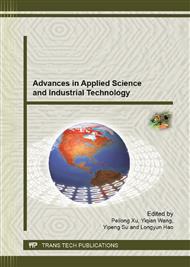[1]
B. Gelb , M. Johnson, J. Journal of Health Care Marketing, (1995), vol. 15, pp.54-56.
Google Scholar
[2]
P. J. Newman, An Investigation of Consumer Reactions to Negative Word-of-Mouth on the Internet[D]. Doctor of Philosophy Dissertation, University of Illinois at Urbana, (2003).
Google Scholar
[3]
F. A. ButtleI, Heard it through the grapevine: Issues In Referral Marketing[D] . Marketing Group Cranfield School of Management, Cranfield University, (1998).
Google Scholar
[4]
Xiaofei Zhang, Dahai Dong. J. management review, 2011, vol. 23, no. 2, pp.88-92. (In Chinese).
Google Scholar
[5]
Jidong Bi. J . Journal of information , (2009), no. 28, pp.46-51. (In Chinese).
Google Scholar
[6]
Zheng-Feng Ma. Study on the relationship of Internet word-of-mouth, brand image and consumer net purchase intention [D] . Nanjing, Nanjing Normal University, (2012)(In Chinese).
Google Scholar
[7]
Liyin Jin. J. economic management, (2007), no. 3, pp.36-42. (In Chinese).
Google Scholar
[8]
S. Nam , J. Retention and Usage, (2007).
Google Scholar
[9]
S .J. Mcmillan, J. Journal of Advertising Research, (2004), vol. 43, no. 4, p.400-421.
Google Scholar
[10]
Chunhua Sun. J. financial review research, (2009), no. 4, pp.96-102. (In Chinese).
Google Scholar
[11]
M. S. Granovetter, J. American Journal of Sociology, 1973, vo. l78, no. 6, p . 1360-1380. 12] E. K. Clemons When online reviews meet hyper differentiation: J. Journal of Management Information Systems, 2006, vol. 23, no. 2, pp.149-171.
Google Scholar
[13]
A. d'Astous,N. Touil , J. Psychology and Marketing, 1999, vol. 16, no. 8, pp.677-694.
Google Scholar
[14]
A. A. Mitchell, P. A. Dacin , The Assessment of Alternative Measures of Consumer Expertise[J]. Journal of Consumer Research, 1996, pp.219-239.
DOI: 10.1086/209479
Google Scholar
[15]
M. C. Gilly, J. L. Graham, M. F. Wolfinbarger,J. Journal of the Academy of Marketing Science, 1998, vol. 26, no. 2, pp.83-100.
Google Scholar
[16]
Zunzhi Wang. D. Taiwan University of science and technology, 2004(In Chinese).
Google Scholar
[17]
Lin Xu. J. Finance and Trade Research, 2007 , no. 5, pp.113-117. (In Chinese).
Google Scholar
[18]
D. Gefen, E-Commerce: J. Omega, 2000, vol. 28, no. 6: 725-737.
Google Scholar
[19]
W. G. Kim , C. Lee , S. J. Hiemstra, J. Tourism Management, 2004, vol. 25, no. 3, pp.343-355.
Google Scholar
[20]
H. S . Bansal , P .A. Voyer , J. Journal of Service Research, 2000, vol. 3, no. 2, pp.166-177.
Google Scholar
[21]
S. Senecal, J. Nantel , J. Journal of Retailing, 2004, vol. 80, no. 2, pp.159-169.
Google Scholar
[22]
T. Sun , T. Youn T, G. Wu, Online word-of-mouth(or mouse): J. Journal of Computer -Mediated Communication, 2006, vol. 1, no. 4, pp.1104-1127.
Google Scholar
[23]
G. N. Punj ,R. Staelin, J. Journal of Consumer Research, 1983, vol. 9, no. 4, pp.366-380.
Google Scholar
[24]
E. J. Johnson ,J.E. Russo , J. Journal of Consumer Research, 1984, vol. 11, no. 1, pp.542-550.
Google Scholar
[25]
D. Smith, Trust Me, Would I Steer You Wrong ? The Influence of Peer Recommendations Within Virtual Communications[D]. Chicago University of Illinoisat Chicago, (2002).
Google Scholar
[26]
D. Smith, S. Menon , K. Sivakumar, Online peer and editorial recommendations, trust, and choice in virtual markets[J]. Journal of Interactive Marketing , 2005 , vol. 19, no . 3, pp.15-37.
DOI: 10.1002/dir.20041
Google Scholar
[27]
H. S. Bansal , P. A. Voyer, J. Journal of Service Research, 2000, vol. 3, no . 2, pp.166-177.
Google Scholar
[28]
R. B. Money, M. C. Gilly , J L. Graham, J. The Journal of Marketing, 1998, pp.76-87.
Google Scholar
[29]
J. Fong, S. Burton, J. Journal of Interactive Advertising, 2006, vol. 6, no. 2, pp.61-70.
Google Scholar
[30]
A. Chaudhuri , J. Journal of Marketing Theory and Practice, 2000, vol. 8, no. 1, pp.1-14.
Google Scholar
[31]
Hui Li. The effect of negative word-of-mouth on hotel customer purchase decision(D). Hangzhou: Zhe jiang University, 2008, p.6. (In Chinese).
Google Scholar
[32]
P. ChatterJee, J. Advances in Consumer research, 2001, no. 28, pp.129-133.
Google Scholar
[33]
Xin Li. J. He nan social science, 2010 (18): 99-101. (In Chinese).
Google Scholar


